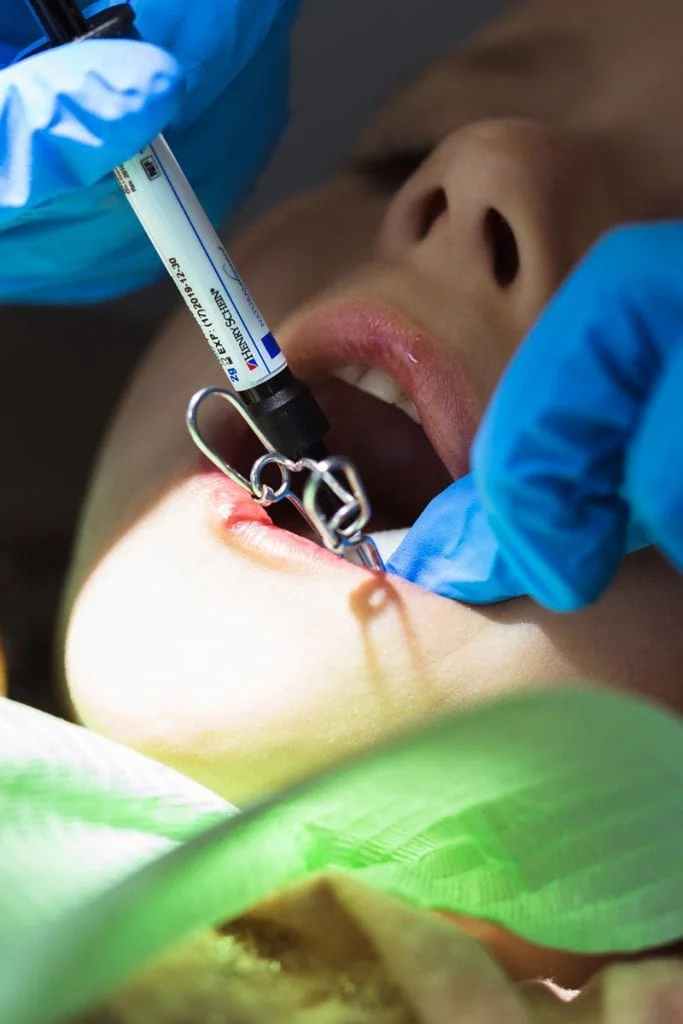Preventative Care in Kitchener
Services
Our preventive care services are key to maintaining your oral health and preventing dental issues before they start. We provide professional cleanings, fluoride treatments, and sealants, alongside personalized advice on home care routines. Trust us to help keep your smile healthy and vibrant through proactive dental care.
Preventative Care in Kitchener at Deer Ridge Dental
Preventive care in dentistry refers to the practices and treatments designed to prevent dental issues before they occur or catch problems in their early stages, often before they cause discomfort or significant damage. The goal of preventive care is to maintain optimal oral health, avoid tooth decay, gum disease, and other dental conditions, and reduce the need for more invasive and costly dental procedures down the road.
Preventive dental care is an essential part of maintaining a healthy, attractive smile and overall well-being. By practicing good oral hygiene at home, attending regular dental check-ups, and utilizing preventive treatments like cleanings, fluoride, and sealants, you can significantly reduce the risk of developing dental problems. Early detection, education, and proactive treatments are the keys to a lifetime of good oral health.
If you haven’t seen a dentist or your dental hygienist recently, it’s never too late to start taking preventive care seriously. Your oral care provider will work with you to create a personalized care plan based on your needs and risks.

- Routine Check-ups and Exams: Regular dental check-ups, typically every six months, are essential for maintaining oral health. During these visits, the dentist will perform several important tasks:
- Examine teeth and gums: The dentist checks for signs of cavities, gum disease, oral cancer, and other oral health issues.
- Take X-rays: Dental X-rays help detect problems that aren’t visible to the naked eye, such as cavities between teeth, bone loss, or issues with the roots of the teeth.
- Oral cancer screening: The dentist checks for signs of oral cancer by examining the mouth, throat, and tongue.
- Check for bite and jaw alignment: The dentist will assess whether your teeth are properly aligned and look for signs of TMJ (temporomandibular joint) disorders or other bite issues.
- Professional Cleanings with your Dental Hygienist: Even with regular brushing and flossing, plaque and tartar can build up over time. A dental hygienist performs a professional cleaning to remove plaque, tartar, and stains, preventing issues like cavities and gum disease.
- Scaling: This process removes tartar (hardened plaque) from the surface of teeth, particularly along the gumline and between teeth.
- Polishing: After scaling, the hygienist polishes your teeth to remove any remaining plaque and help prevent future plaque buildup.
- Flossing: The hygienist may also floss your teeth and demonstrate the best techniques for at-home flossing.
- Fluoride Treatments: Fluoride is a natural mineral that helps strengthen tooth enamel and protect teeth from decay. While fluoride is often found in drinking water and toothpaste, additional fluoride treatments can be applied in-office to provide extra protection, especially for those at higher risk for cavities (children, older adults, people with dry mouth, etc.).
- Dental Sealants: Sealants are thin, protective coatings applied to the chewing surfaces of the back teeth (molars and premolars), which are prone to cavities due to deep grooves that trap food particles and bacteria.
- Sealants act as a barrier, preventing bacteria and food from entering the grooves and helping to reduce the risk of cavities.
- This is a particularly beneficial preventive measure for children and teenagers, but it can also be used in adults who are at risk of decay.
- Mouthguards and Nightguards
- Mouthguards: If you play sports, a custom-fitted mouthguard can help protect your teeth from injury, fractures, or tooth loss due to impact.
- Nightguards: For patients who grind or clench their teeth (a condition known as bruxism), a nightguard can prevent damage to the teeth and help alleviate jaw pain and headaches.
- Oral Hygiene Education: One of the most important aspects of preventive care is teaching patients the proper way to care for their teeth at home. Dentists and hygienists provide personalized recommendations for:
- Brushing: Use a soft-bristled toothbrush and fluoride toothpaste, brushing at least twice a day for two minutes each time. Brushing effectively removes plaque and prevents tooth decay.
- Flossing: Flossing at least once a day removes food particles and plaque between the teeth that a toothbrush can’t reach.
- Dietary Advice: Eating a balanced diet and limiting sugary snacks and drinks can help protect teeth from cavities and gum disease.
- Avoiding harmful habits: Avoiding smoking and excessive alcohol consumption can also help maintain good oral health.
- Preventive Treatment for Gum Disease (Periodontal Care): Gum disease is a major cause of tooth loss and has been linked to serious health conditions such as heart disease and diabetes. Preventive measures include:
- Scaling and root planing: In patients with early signs of gum disease (gingivitis), a professional cleaning may be necessary to remove plaque and tartar below the gumline.
- Gum disease screening: Dentists check for signs of gum disease during exams, including inflammation, bleeding, or pockets between the gums and teeth.
- Preventive periodontal care: For patients with more advanced gum disease (periodontitis), more frequent cleanings and sometimes additional treatments may be recommended to manage and prevent further damage.
- Early Detection of Dental Problems: Preventive care is about detecting dental issues before they become significant problems:
- Cavity detection: Dentists use tools such as digital X-rays, intraoral cameras, and visual inspections to catch cavities early, often before they cause pain.
- Gum disease monitoring: Dentists monitor the health of your gums, checking for signs of gingivitis or periodontitis and addressing any issues early before they progress.
Are You a New Patient Looking for a Dentist in Kitchener?
Your smile is worth protecting—don’t wait for dental issues to develop. At Deer Ridge Dental, your trusted dentist in Kitchener, our experienced team is dedicated to providing personalized, high-quality care to keep your smile healthy and confident. For any dental procedure in Kitchener, our team ensures comfortable, confident care. We’re committed to making your experience smooth and stress-free, so you can smile with ease.
Who Benefits from Preventative Care?
Children and Teenagers
- Children, particularly those with primary (baby) teeth or newly-erupted permanent teeth, benefit from preventive treatments like fluoride treatments and sealants to protect teeth from cavities.
- Regular visits help establish a good oral hygiene routine and monitor the development of their teeth and gums.
Adults
- Routine exams and cleanings help detect issues like cavities, gum disease, and oral cancer early. Many adults may also benefit from professional whitening or oral cancer screenings.
- As adults age, they may experience dry mouth (which increases cavity risk) or other health conditions that affect their oral health, making regular preventive care essential.
Seniors
- As people age, they may experience more complex dental issues, including gum recession, root decay, and the potential for tooth loss. Preventive care helps manage these issues and maintain overall oral health.
- Dentures or partial dentures may also need regular check-ups and adjustments.
Patients with Risk Factors
- Individuals with a history of tooth decay, gum disease, or oral cancer may require more frequent visits or specialized preventive care to maintain oral health.
- Those with chronic health conditions (like diabetes or heart disease) should pay special attention to their oral health, as they may be at higher risk for complications.
- Smokers and individuals with dry mouth (due to medications or other factors) may also need extra preventive measures.




The Benefits of Preventive Dental Care
Cost Savings
Better Oral Health
Overall Health Benefits
Improved Apearance
Reduced Discomfort & Pain
Our Dental Services
At Deer Ridge Dental, we offer a range of dental services for you and your family.

MEET OUR DENTIST
Dr. Harry Lo, DDS
Book Your Dental Appointment Today
Give your child the best dental care today. Deer Ridge Dental offers expert Preventive Dental Care in Kitchener for healthy, confident smiles. Book Now!